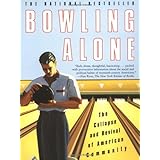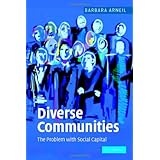
Average Reviews:

(More customer reviews)Putnam's commentary on modern American life is frightening at best.
I read Putnam's article by the same title in college and it left a lasting imprint because it crystalized my feeling that Americans are no longer involving themselves in civic and community life. His new book expounds on this depressing thesis and explains, in tremendous detail how Americans no longer value civic engagement or regard relationships with neighbors as worthwhile. He cites declines in participation in public clubs such as the Shriners and Elks clubs as well as more informal social gatherings like poker playing and family dinners. Using statistics and time diaries he plots indicators of civic engagement from its peak in the early 1960's and its subsequent decline thereafter. The greatest casualty throughout this transformation is in social capital, a term which predates Putnam and describes the emotional and practical benefits of personal relationship.
Putnam shows that civic clubs that have shown growth in membership since the 1960's have mostly been in massive national organizations whose membership is nothing more than people on mailing lists who pay an annual fee. Furthermore, religious organizations, whose members participate in their communities at greater rates than non church goers, are beginning to change their focus from civic participation to only tending to the needs of their church members.
The affects of this disengagement have impacted our health, democracy and safety. Putnams points out an axiomatic principle that as people associate with one another in various capacities, whether it be at the kitchen table, the sidewalk, the card club or the PTA, people form relationships that provide a pool of friends who can be relied upon when time are hard, the dog needs to be walked, or the poor elderly woman next door needs her home painted. Each relationship is an asset, the accumulation of which can be called one's "social capital."
Putnam does not place the blame for this on one source, but cites the entrance of women into the workforce, high levels of divorce, and urban sprawl among others as possible contributors. His most damning remarks are reserved for television. According to Putnam, no single technology has had such a damaging effect on America's civic and personal relationships. I enjoyed his attack on TV on a personal level because I decided 5 years ago to throw away my television and have never looked back.
Certainly, Putnam's concerns are not new. He admits to this and provides the reader with an excellent look at the Progressive Era when American's decided to solve the vexing problems of an industialized urban society by forming civic clubs and actively involving themselves in their community.
This is not a particularly fun book to read. In summary, it details how Americans have become spectators on life. The recent success of "reality based" television programs only illustrates how we have traded the potential richness of personal relationships for a false reality on our television screens. Life is about personal relationships, and it is sad to see how Americans have avoided these relationships.
Putnam is not all gloom and doom. As with everything, hope abounds. After reading this book, one should only be encouraged to find ways to involve himself or herself in their communities and invite the neighbors over for a BBQ. This is an important social commentary, and I encourage all to read it.
Click Here to see more reviews about:
Bowling Alone: The Collapse and Revival of American Community Get 37% OFF
Get 37% OFF
Click here for more information about Bowling Alone: The Collapse and Revival of American Community




